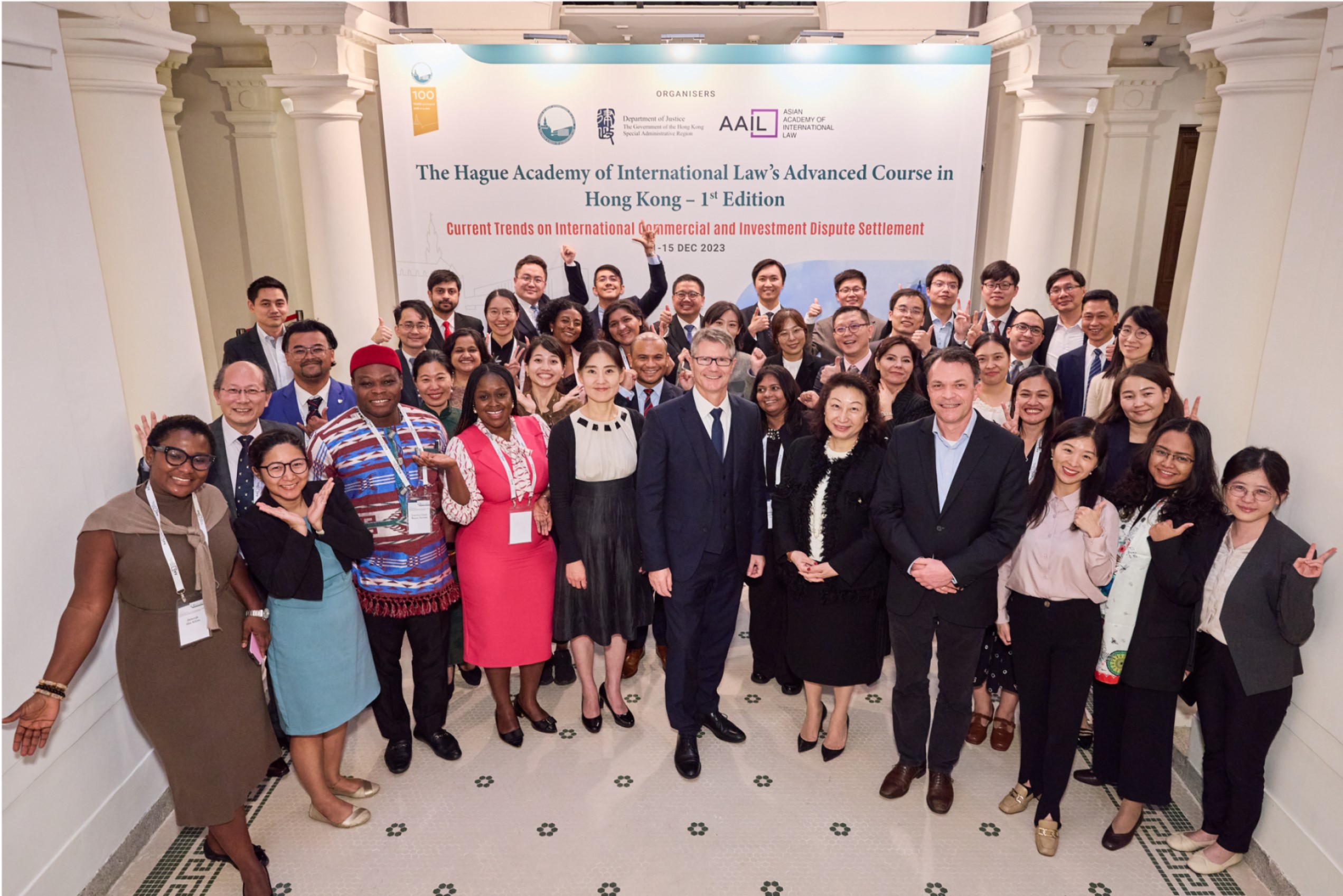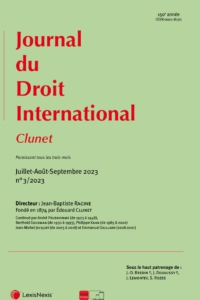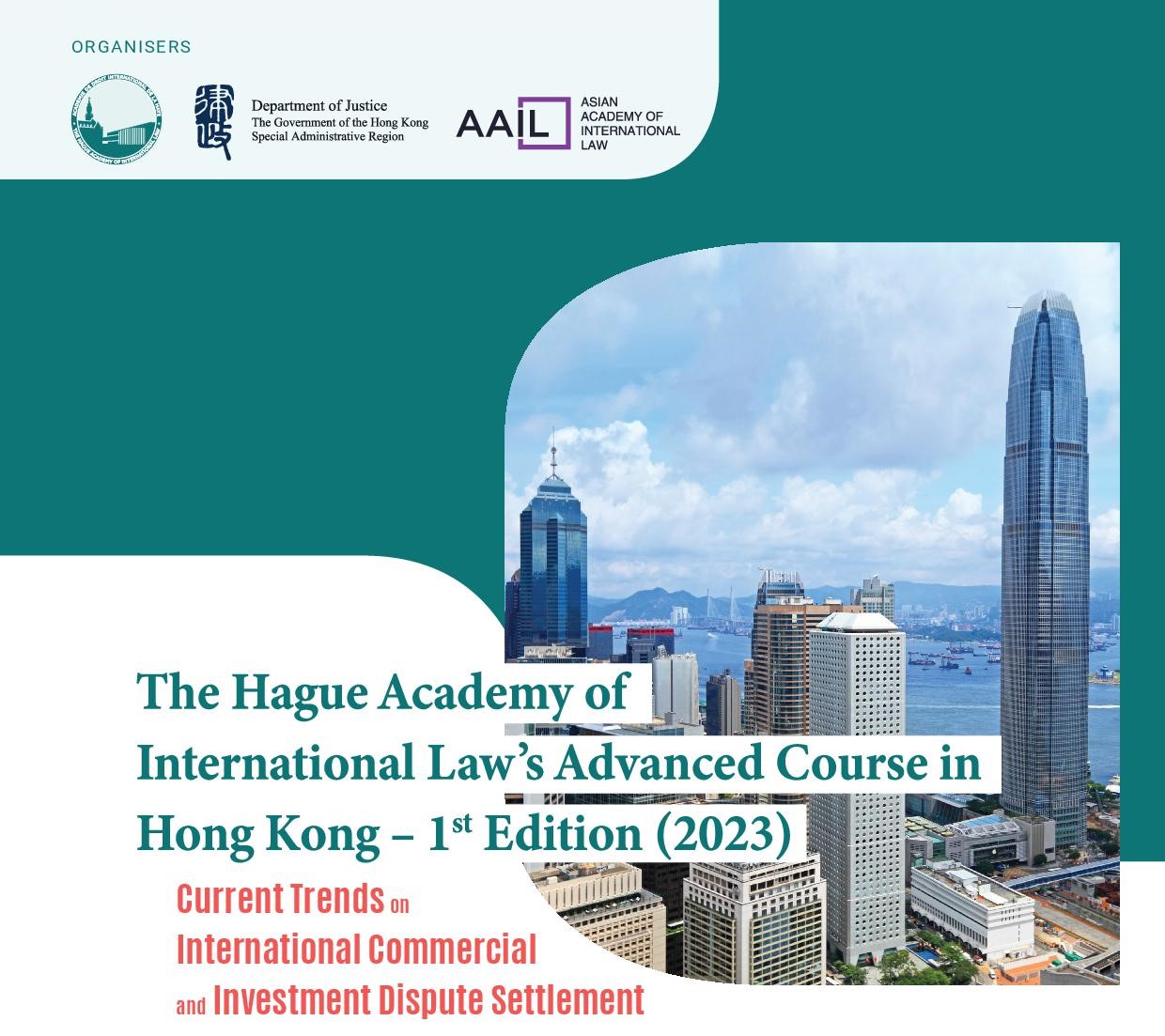First edition of The Hague Academy of International Law’s Advanced Course in Hong Kong on “Current Trends on International Commercial and Investment Dispute Settlement”
From 11 to 16 December 2023, the first edition of The Hague Academy of International Law’s Advanced Course in Hong Kong was held, co-organised by the Asian Academy of International Law and the Department of Justice of the Government of the Hong Kong Special Administration Region. For this programme, the Hague Academy of International Law convened distinguished speakers to deliver lectures on “Current Trends on International Commercial and Investment Dispute Settlement”.
After welcome notes (Adrian Lai, Deputy Secretary General and Co-Convenor of the Advisory Board of the Asian Academy of International Law; Teresa Cheng, Founding Member and Co-Chairman of the Asian Academy of International Law, also on behalf of Christophe Bernasconi, Secretary General of the HCCH; Jean-Marc Thouvenin, Secretary-General of The Hague Academy of International Law; and Lam Ting-kwok Paul, Secretary for Justice of the Government of the Hong Kong SAR) a welcome lunch was offered where a “beggar‘s chicken” was offered, to be hammered out of the bread casing…
In the afternoon the first class, delivered by Natalie Morris-Sharma, Singapore, focused on the UN 2018 Convention on Settlement Agreements Resulting from Mediation (Singapore Convention). Structuring her lecture around the drafting procedure of the new instrument, the former Chairperson provided valuable insights into the deliberations within the Working Group. For instance, the question what form (international treaty, model law, or mere guidelines) the future instrument should take was literally up for debate until the very last session, as some delegations felt that national approaches to enforcing settlement agreements were far too different to justify the adoption of a uniform “hard law” solution. This uncertainty during the discussions is the main reason why the Working Group has taken the unusual course of action to produce not only the Convention but also the amended UNCITRAL 2018 Model Law on International Commercial Mediation. Further in the lecture, it was emphasised that the Singapore Convention has taken a stance on at least one of these differences, the legal nature of the mediated settlement agreement. By providing for the “enforcement” (“relief”) in Articles 3 and 4 which can only be refused on the limited, discretionary grounds contained in Art. 5, the Singapore Convention rejects the traditional view that mediation results in nothing more than a contractual obligation. Finally, the future of the instrument has been discussed, in particular the reasons why the major economic powers (China, EU, USA) have not yet ratified the Convention.
The next morning, Diego Fernández Arroyo started his lecture on investor-state dispute resolution. Using the Euro Disneyland negotiations as an example, in which corporate counsel Joe Shapiro, envisaging the possibility of legal disputes with the French government, pushed relentlessly for the inclusion of an arbitration clause, he first illustrated the practical importance of ISDS. Subsequently, the historical development of this area of law from diplomatic protection to international arbitration was summarised, with particular reference to the highly specialised International Centre for Settlement of Investment Disputes (ICSID) established under the auspices of the World Bank Group. He stressed that the submission of investment disputes, that involve a public law (global) governance dimension, to essentially the same resolution mechanism as private law commercial disputes is by no means self-evident. On this foundation, Fernández Arroyo finally turned to the contemporary criticism towards the current ISDS practice. He stated, inter alia, that the concerns regarding transparency have been adequately addressed through the adoption of new standards (e.g. Mauritius Convention, UNCITRAL 2014 Rules) and elaborated on the prospects of the Multilateral Investment Court project advocated by the EU.
Then, Franco Ferrari made use of his part of the course on international commercial arbitration to powerfully challenge an overly idealistic understanding of international arbitration. Appealing in particular to the Hong Kong barristers in the room, he initially demonstrated how the loopholes between arbitration and litigation may be strategically utilised in legal practice. While the existence of an arbitration agreement obliges the court to dismiss a claim, it does not prevent filing a lawsuit in the first place. Hence, the resulting fear of publicity or discovery can be used effectively as leverage in settlement negotiations. Thereafter, quite in contrast to the idea of global governance underlying the ISDS frameworks, he reminded the audience of F. A. Mann’s statement: “every arbitration is a national arbitration, that is to say, subject to a specific system of national law”. Along the lines of this famous bon mot, Ferrari highlighted the persistent relevance of the lex loci arbitri by examining, among others, whether the provisions of the UN 1958 Convention on Recognition and Enforcement of Foreign Arbitral Awards (New York Convention) require an “international” or rather a “domestic” reading. In this context, he discussed with the audience the doctrine of delocalisation as promoted in French jurisprudence (e.g. Cass. Civ., 23 mars 1994, Hilmarton, Bull. 1994 I N° 104 p. 79). From the perspective of legal positivism, those approaches, even if striving for a truly transnational understanding, are nevertheless dependent on the applicable domestic legal framework, which is determined by the seat of the respective arbitration.
In the following, the author of these lines focused on the settlement of international disputes before domestic courts. After laying out a foundational theory for designing judicial cooperation in civil matters within a field of “trust” and “control” (“trust management”) in regard to foreign sovereign judicial acts, in particular foreign judgments, to be integrated (or not) into a state’s s own administration of justice, this theory was then applied to the “Hague Package” (Christophe Bernasconi) of instruments on judicial cooperation in civil matters, starting with the HCCH 2019 Convention on Recognition and Enforcement of Foreign Judgments in Civil and Commercial Matters (e.g. when and why and to what extent foreign courts are “courts” in the sense of, inter alia, Art. 4 of the Convention?), touching further upon the ongoing HCCH Jurisdiction Project (currently mainly focusing on parallel proceedings), the HCCH 2005 Choice of Court Agreement Convention, as well as the HCCH Conventions on Service, Taking of Evidence, and the Apostille. This emerging “Hague System” – that is evidently emerging under fundamentally different conditions than the well-established “Brussels System” within the EU’s supranational Area of Freedom, Security and Justice – was contrasted with current escalations of “distrust”, such as e.g. the current trend of antisuit injunctions (ASIs), anti-antisuit injunctions (AASIs) and even anti-anti-antisuit injunctions (AAASIs) in international Standard Essential Patent (SEP) ligitation in respect to setting global FRAND licences, involving domestic courts from all over the world (e.g. China, Germany, India, UK, USA etc.) – an area of law which is – unfortunately – excluded to a large extent from the material scopes of the younger HCCH Conventions.
Jean-Marc Thouvenin added with a fascinating lecture on dispute settlements before the International Court of Justice, and Judge Gao Xiaoli explained the latest developments of dispute resolution in (Mainland) China, in particular the setting and functions of China’s Supreme People’s Court’s International Commercial Court (CICC).
In the afternoon of the last day, the participants, coming from more than 20 nations, received their certificates, and the week concluded with a closing reception in celebration of the Centenary of the Hague Academy against the background of Hong Kong’s skyline.
The Course took place in the chapel of the historic Former French Mission Building, later the seat of Hong Kong’s Court of Final Appeal. Lectures and participants convened in the former hearing hall of the building which added further inspiration to the vivid and intense discussions about the settlement of international commercial disputes on all avenues and levels, a holistic perspective that some liked to call an “integrated approach” (M. Weller, Festschrift für Herbert Kronke 2020), others a “pluralistic dispute resolution” (“PDR”, see e.g. Wang/Chen, Dispute Res. in the PRC, 2019).





 é français (A view from Quebec on the project of a french private international law Code) is authored by Prof. Sylvette Guillemard (Université Laval). The abstract reads as follows:
é français (A view from Quebec on the project of a french private international law Code) is authored by Prof. Sylvette Guillemard (Université Laval). The abstract reads as follows: